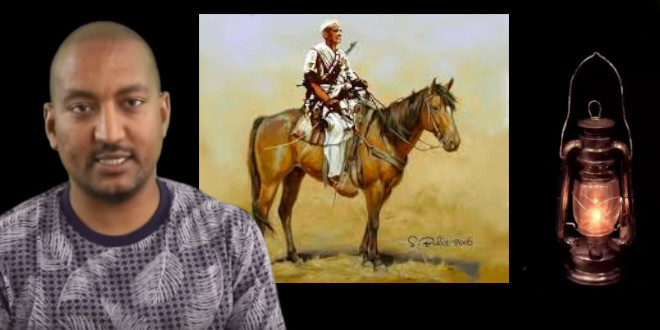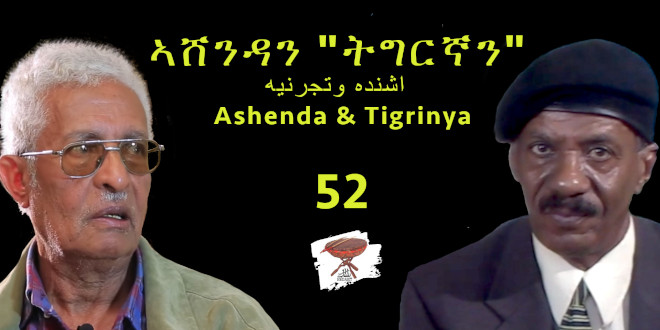Of Kings And Bandits
Today’s Negarit is somewhat of a commercial; Negarit has begotten negaritmedia.com. And Negarit Media has begotten its first book, ‘Of Kings And Bandits.’ What led into all of that?
Four of every five people I know have urged me to write a book; I know what it takes to write and I would just nod: Insha’Allah. I have written enough articles to know the time sacrifice and mental torment one goes through after writing a three-or-four page article. I have done it for fifteen years and the thought of writing a book gave me jitters. But finally, I said to myself, what the heck, I will do it. After all, the work involved would be just about fifty articles worth of material. I succumbed to the urging.
Was I wrong! Was I terribly wrong.
I took the final decision to write this book in November of 2007 and I was excited when I finished my first 120,000 words draft. Two months and it will be published, I dreamt. Nope. In two months I decided to print the draft and do some editing (with a red pen). When I finished, the pages were all colored red. Draft two retyped, I printed it and read it again. It ended up being more red than black. By that time, six months had already passed. This should be it, I said, I am done and I put the manuscript down (now I called it a manuscript) only to reread it after a month.
It never ends. Every time you edit a manuscript, it cries for more. New ideas pop up; inconsistency of the story slaps you on the face; you cannot pronounce the names of some of your characters anymore—how is the reader supposed to pronounce or remember them if you can’t? The torment goes on. That is why it took me thirteen draft manuscripts and two years and half to finish what I began to write on November of 2007.
Since then, I have changed the title five times. Designing the cover was another grueling task; finally I called it a day. And off the manuscript went. My editor critiqued it and she sent me her invaluable suggestions and comments. I went through that as well. By then, I had spent hundreds of hours and the work was taking its toll on me.
All along, I had my friend Saleh Younis who is brutal when it comes to critiquing: he was a relentless critic of the work. Other friends went through it and I was humiliated trying to absorb all of their input, learning to see the manuscript from the perspective of others.
Some sixteen years ago, I wrote a small poetry book entitled “Simply Echoes.” But I did that in my spare time and from a collection that I had accumulated over the years. That was a stroll on the beach compared to what I went through over the last two years and half. Now, after the tough experienced of writing ‘Of Kings And Bandits’, I have developed great respect for anyone who is disciplined enough to write a book. I know how much they toiled.
It is a killing lonely task.
When I was growing up, I lived among my elders and family who recounted to me their lives and histories of events that happened long before I was born, in so much detail that I felt I lived in their era. Growing up away from their natural habitat, many young Eritreans didn’t have that opportunity, their understanding of life in Eritrea, and its history, is relatively poor. I discussed the manuscript with many youngsters and received invaluable insight. They challenged me: ‘What if you were to write a book to be read in a classroom for those who didn’t live the sixties and seventies?’
An ambitious goal, for sure, but the idea for ‘Of Kings And Bandits’ was an answer to that challenge.
I have talked to many people and many tell me that they are sitting on manuscripts that they will someday publish. Good, we have created Negarit Media for that purpose. Why?
Trying to publish the book, I went through the complicated maze of the publishing world. It is a very tough industry. I learned a lot. A lot. There are two business models in use: Royalty-based publishing and self-publishing—nothing in between. I decided to take the risk and create another business model: cooperative publishing, a hybrid between self-publishing and royalty based publishing. And so, come one, come all established writers, and aspiring writers, negaritmedia.com is here to help you get published (details will be published in due time).
When I started to write on the Internet, it was simply because I love writing. Over the years I have tried to maintain my style of storey telling. But since the Internet is dominated by activism and politics, one is bound to be involved in a debate and avoiding polemics (and its creation, polemical writing) is impossible.
Of Kings And Bandits has helped me regain my original voice. I wrote it with the idea of story telling in my mind. I hope you will enjoy it.
This is the time to give my readers a gift in the form of a preview from the first chapter. Here is an excerpt of a chapter, I will let you judge:
A low flying military helicopter hovered above, the legs of the gunner sitting behind a machine gun dangled from the open door. Jemal, a ten-year old child, was terrified by the noise of the machine as he looked up and clearly saw the pilot’s dark glasses and white helmet behind the windshield. He was on an errand to pick a set of hinges for the kitchen door in his house. Jemal took the long way to the blacksmith’s workshop to avoid Ambess, the dog that scared him so much he avoided the alley where the dog spent his day. Jemal grew up practically banished from his neighborhood alley.
On the street, under the noise of the helicopter, a man pulled a camel loaded with two long upright-strapped bundles of firewood balanced on its sides. He shouted, “Echei, echei,” advertising his products which seemed difficult to sell. He has to sell the pair of upright bundles together; otherwise, the load would lose balance. A woman with a shawl covering half her face had just bought the shqqel, the small load tied to the bigger bundles in front of the camel’s hump.
Ashiny car leisurely approached. It was Mirqani driving his Peugeot, one of four cars that passed on that dirt street, three of which he owned. He is, so everyone said, a descendant of Prophet Mohammed and the chief of the Mirqani family, patrons of the Sufi order, to which the overwhelming majority of Eritrean Muslims belonged.
The camel panicked and almost threw off its load as the car approached. The wood seller restrained the camel, systematically pulling and releasing the leash as the animal struggled to escape from the car. It groaned, foam oozed from both sides of its wide-open mouth, and it seemed it would bite off the wood seller’s hand with its big yellowish teeth. Mirqani slowed his car and waited for the camel to calm down. A few people on the street took the opportunity to approach his car, and reach for his hand, which he stretched out through the window for the convenience of those who raced to kiss it. Jemal stood there and stared at him; Mirqani stared back with piercing eyes. He could have been wondering why the boy did not kiss his hand, he must have been unsure of how the future generation would carry the tradition.
Jemal knew better. His parents had always warned him not to kiss anybody’s hand with the exception of respectable elderly people, or those who would kiss his hands in return. Based on their demeanor and age, he made arbitrary judgments to determine if an elderly person was respectable or not. And here was Mirqani, his hand stretched out to bless those who kissed it, some of whom rolled cash bills into it. He didn’t kiss back anybody’s hand, and Jemal would not kiss that hand.
After staring at him for a while, feeling the discomfort of not kissing the hand of the man everybody raced to kiss, Jemal reluctantly tipped his head and passed a stiff smile. Mirqani returned a reserved smile.
The car passed and the wood seller, relieved, took the time to vent some residual anger—restraining a panicky camel is difficult. He cursed; Jemal couldn’t understand if the wood seller cursed the camel or the car and the driver. No doubt the wood seller didn’t know it was Mirqani behind the steering wheel. If he did, he surely would have raced to kiss the stretched hand, considering the encounter a blessing just like the rest of the people. Jemal didn’t care for such a blessing.
Wood sellers had to report to the wood market with their camels when they arrived in town. They left after paying taxes to a municipal officer, who carried a moneybag and a book of tax tickets. Had he found a buyer there, he would have delivered the load earlier, and he would have bought his needs and left on the dirt road back to his village. It was late, the market must have been slow—otherwise, he wouldn’t be roaming the streets and exposing himself to the heat of the sun for long hours, draining his energy.
Jemal passed the angry wood seller and continued his way to the blacksmith.
A little further, he saw young girls with shawls covering their heads, carrying empty baskets. They walked towards the market to buy food for their families; they were running late.
Suddenly, three menacing boys including Omer, who always pestered Jemal, appeared from the corner of a narrow street dragging a seven-year old boy to the Koran school, the Khelwa. The boy kicked, punched and screamed, but he couldn’t break free from the two boys, who carried him like a half-full sack of grain. They walked up towards the Khelwa following Omer, who appeared to be their leader. Jemal guessed Omer had guided the boys to the house of the victim. The sheikh had sent the bigger boys to drag the absent boy from his home and forcefully make him attend Khelwa, an act known as jerjera, dragging. Not even parents interfered to stop the dragging of their children. They had pledged to the sheikh when they enrolled their child: “I own his bones, but his flesh is all yours.” From then on, until the child finished studying, the sheikh had full authority to discipline the child and punish him in any manner he saw fit, including whipping, provided, as the initial verbal contract stipulated, he didn’t break a bone. Only in that case would the parents have the right to interfere.
Jemal’s father, Bakri, never made such a pledge—he didn’t like the idea of someone beating up his son, something he didn’t do himself. He didn’t take his son to the Khelwa anyway; Jemal went on his own and stayed only for a few months. Now seeing the boy mercilessly dragged, Jemal felt happy it was not him. He continued on towards the bank of the Shfshfi River, to the blacksmith’s workshop, and found him sitting in a chair with a group of men huddled around a small table, talking in whispers. The blacksmith had his shirt on, not bareback as he usually worked pounding on the red-hot iron and sweating like a gladiator. Iron rods in the forge burned red hot but the place looked unusually calm. The anvil and hammer looked idle and cold—the blacksmith didn’t seem to have done any work that morning.
Clearing his throat, just to catch their attention, Jemal greeted them: “Asselam waalleikum.”
The blacksmith turned his face, “Jemal my son, tell your father the hinges will be ready tomorrow,” and immediately turned his face back to the group. Jemal understood that to mean ‘go away.’
The blacksmith’s face was ashen; he looked sad and worried and talked to the men in a low voice. Jemal overheard a few words that grabbed his attention: Jebha, Commandos, Mehlab, words that aroused his curiosity. Jemal knew “Eritrea, Jebha” were good and “Ethiopia, Janhoi, Commandos” were bad. He didn’t know what Mehlab meant. Jemal couldn’t make an excuse to stay around longer, as the blacksmith’s sons were not there. Though eager to find out what they were talking about, aware of his awkward presence among the elders, he walked out and decided to go to his father’s shop.
On his way, he passed through the market, where stalls offered plenty of fresh vegetables and fruits. Donkeys loaded with guava fruit stood on the streets tethered to tree trunks or lampposts, but no one seemed to be interested in buying any of the fruits. That season, the rains had been excellent and the farmers had reaped a plentiful harvest, so they priced the abundant Guava in donkey-loads and not in kilos or basketfuls.
Across the street, men delivered freshly slaughtered goats to the butcher shops from an old van with open doors, its noisy engine running and its low exhaust pipe letting out fetid black smoke. Inside the van, a gruesome sight of skinned goats hanging from hooks on a horizontal pole, and blood seeped through the edges of the floor to the sides of the van. Workers, their aprons soaked and smudged with blood, moved back and forth carrying the pale goats…
Good Reading…
Of Kings And Bandits will be officially released on July 4, 2010. A website is now fully functional and is able to process orders: Please visit negaritmedia.com , salehjohar.com, facebook, and twitter.




Awate Forum